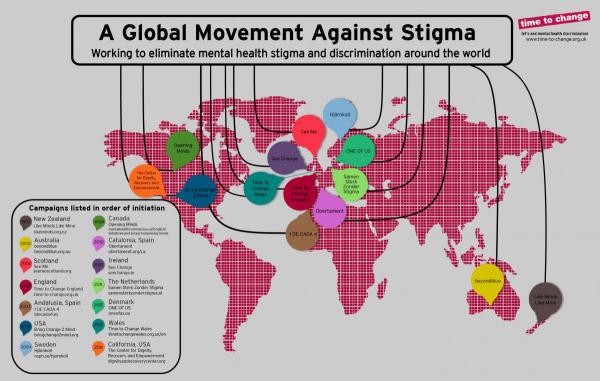Global Anti-Stigma Alliance Conference 2018

The Global Anti-Stigma Alliance
(GASA) was founded in 2012 and currently includes 15 member countries (the core group
being Australia, Canada, Denmark, England, New Zealand, Scotland and the USA).
The Alliance shares best-practice learnings, methodologies, materials and evidence to achieve better outcomes for those facing stigma and discrimination related to mental distress.
We sat down with Laurianne Reinsborough, General Operations Manager at the Health Promotion Agency (HPA), who shared her learnings from the latest GASA conference held in the Netherlands.
Q: How long have you been part of the Global Anti-Stigma Alliance?
A:
HPA, as stewards of the Like Minds, Like Mine programme, have been attending
the Alliance meetings for the past four years.
Q: What do you find to be the main benefits of being a member of the
Alliance?
A: The benefits of attending the Alliance meetings are to
share learnings from around the world. This helps support the Like Minds, Like
Mine programme to continue to achieve its outcome of a socially-inclusive New
Zealand that is free of stigma and discrimination towards people with mental distress.
For example, at the meeting I attended in November, a group of organisations were going to get together to have “one voice” to improve the way media reports about people with mental distress.
Q: What are some examples of great campaigns you saw at the recent Alliance
meeting? How did they help to reduce stigma and discrimination around mental
distress?
A: One great example (in my view) was developed by the
Government of the Balearic Islands. The “Cards Against Stigma” campaign was recently
launched and was developed to combat the social stigma suffered by people with mental
distress.
The campaign has the testimony of seven people with lived experience who were asked what words they wanted to hear about them when their diagnosis was communicated to them.
View the campaign here.
Q: Tell us about the Sane Australia report card.
A: I was really
excited to hear about the National Stigma Report Card that Sane, Australia, will be
launching next year.
The report card will seek to understand how Australians living with complex mental distress experience stigma and discrimination. This knowledge will drive positive change across a range of areas including housing, education, employment and health services.
Dr Michelle Blanchard, Sane Deputy Chief Executive, will be leading this work. HPA will be contacting her in the New Year to find out more about the proposed methodology and approach.
Learn more about the National Stigma Report Card.
Q: Tell us about the opportunities for NZ around Time to Change UK and Ford, and
how this could work in NZ?
A: In April 2018, Ford UK launched a new
campaign in partnership with Time to Change UK to support mental health. In a Ford survey of
over 2,000 people, 53 percent said they like to have conversations in their car or
vehicle, with 56 percent of respondents saying they have had important emotional
conversations in a car.
The campaign is called “Don’t Let Mental Health be the Elephant in the Room”, and targets young men.
Both organisations have benefited from this partnership. It enabled Time to Change UK to have a television commercial supporting the programme and Ford has received advice on mental health in their workplace. Ford is also the first car manufacturing company to sign the Time to Change England employee pledge.
I believe that partnerships are the key to delivering successful programmes. Some New Zealand NGOs already have smart partnerships with commercial organisations, but I’m sure there are more opportunities to be had.
Q: If you could share one key learning from the conference this year, what would
it be?
A: The Like Minds, Like Mine programme and its partners
are doing a great job.
Internationally, they had already heard of the World of Difference programme, which is one of the Like Minds, Like Mine education projects being led by Otago University, and New Zealand is still regarded as one of the leading countries in this space.
